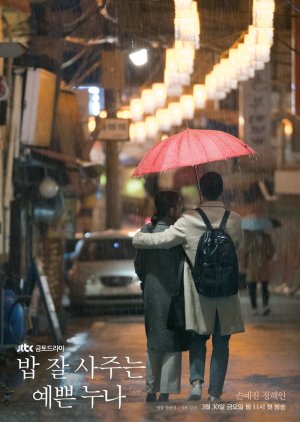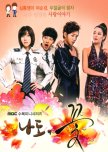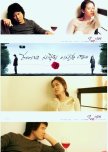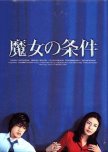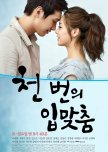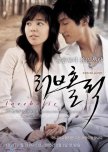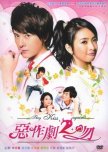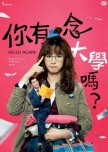
“I fell in love the way you fall asleep: slowly, then all at once”.
For me, this sums up most of this drama. It is watching two people slowly and then passionately fall in love with one another. The doubting if the other feels the same, the awkwardness of new love, the heart fluttering moments, and everything in between. The realism, chemistry, and gradual buildup of the relationship in the story was unlike anything I have ever experienced. It was reminiscent of the director, Ahn Pan Seok’s, previous work Secret Love Affair. Except this is less about two lost souls finding one another and more of a story of realizing the right person was someone you knew all along. Brilliant in its subtleties, this was a true example of a slow-paced romantic melodrama.
However, despite this drama’s strong beginnings, the middle could best be described as lukewarm. Muddled with repetitive plot scenarios that take far too long to resolve, around episode 9 this drama started to feel almost like a chore to watch. The chemistry was still there but the spark was missing, making what could have been my favorite romance of all time, one that I found myself barely making it to its conclusion. But despite its faults, this drama still deserves a solid 8, because it’s first 6 to7 episodes literally had ME feeling butterflies. I even wanted to tell random passersbys to watch this drama if they want to FEEEEEL what it is like for two people to fall in love. I did not think it was possible for me to feel so strongly about a drama, and for this it deserves the 8.
Overall, I recommend it, but mostly the first nine episodes. After that, you could probably skip to the finale and be just as satisfied.
Was this review helpful to you?

Down to earth romance, providing troubling insight on what South Korean women are facing these days
"Something in the Rain" is a love story about an older woman (35) with a younger man (about 27/28). Yet, above all, the KDrama is a critical social study about relationship taboos and parental respect in South Korea as well as sexism in the workplace. Authentic. Bitter. Sweet.The original title of the KDrama "Pretty Nuna, who invites me to dinner" contains the taboo relationship with all its dynamics on which the story is based - the woman is older (´nuna´) than her boy friend (a no-go!)..., and still being a sucessful employee she earns good money instead of being married (another no-go). Actually in South Korea this is a serious problem of a recent generation gap and gender conflict.
Just consider the significance of "Something in the Rain" (as the romance that it is) in such a broader sense. If you are missing a special icing throughout the story, than this is simply what it is. It is supposed to. Overall, I consider "Something in the Rain" a rather up to date, down to earth, authentic romance, providing troubling insight what kind of circumstances South Korean women (and men) are facing these days.
--------------------- SIDE NOTE --- South Korean women and romance in everyday day life
In relation to everyday life in South Korea the focus on romance and true love in KDrama takes on a whole new meaning. Very few people really have time for a relationship during their professional life. The working days are long. In addition, women are discriminated against at work, sexualized and reduced to their gender role. They work harder (and often more efficiently) than their male counterparts, but are paid less and are less likely to be promoted, as they are bound to get pregnant soon. If they really do get pregnant, then that's it for professional life. Child care for 70-80 workhour weeks (with commuting and company dinners) is hardly affordable. Women do not have to hope for flexible working hours from their employer. So women with children inevitably end up at the stove. Women can forget about returning to work.
As a daughter, women already have a difficult time in the family. If they are married, then first of all they have to relieve the elders - in both families. (If they are not married, they are blamed or rushed oder pushed to quickly do so). Men, on the other hand, are celebrated by families as sons from the start. Accordingly, they present themselves in public with self-confidence and appear more macho. It's not uncommon for them to loudly and rudely gossip about the looks of women in the coffee shop or restaurant or shop or at work or in public. (Actually with the job market being extremely competitive, the appearance of women can not only decide about the partner, but also about the employment).
There are numbers from surveys showing that on average, seven out of ten South Koreans don't have time to date and only about four out of ten are in a committed relationship. The work is more important. Not necessarily because they identify with it so much, but because they don't want to lose it. The pressure to perform is enormous for everyone. As a result, 3/4 of South Korean women between the ages of 25 and 29 are not yet married. Among women between the ages of 30 and 34, more than half are still unmarried. South Korean women also have increasingly modern demands for a self-determined life. They are less and less interested in macho men and suffocating family structures that reduce them to rasing children, representation and the home. This is also due to the fact that normal households can hardly cover their expenses. Family costs money. Divorce rates are rising (South Korea is having one of the highest in the world), yet women are finding it difficult to return to work. There is also a stigma to living as a single parent. (Accordingly, these days not only unmarried couples, but also married couples are less likely to have children.)
Society is in a dilemma. In fact, it can't help but modernize its patriarchal, women-discriminating value systems if it wants to survive. The South Korean population will otherwise shrink under the given circumstances from 2027 onwards. (Update 30.7.22: Statistics Korea reports on 28. July 2022 first time shrinking in 2021 already...)
Was this review helpful to you?

THE CASTING & ORIGINAL STORY SET -UP
In a recent interview, PD Ahn said he wanted to work with SYJ. He felt that she was the best actress to play a mid-30s woman at the centerpiece of this realistic drama. “That’s why, from the very beginning, I thought that there was no one else for the leading role of ‘Pretty Noona’ but Son Ye Jin. I only contacted one person [for the role], and it worked out. She decided to take the role even after seeing all the negative sides to it.” He added with a laugh, “I was really surprised.”
SYJ said she also wanted to work with the director. Her fellow actresses gave him high marks. And when she was recruited for the series, PD Ahn promised he would do things so she could meet her goals. As a result, the series was shot more like an independent art film. There were little wasted scenes. And the mood on the set was fun but professional.
SYJ is a professional. Her reputation is to immerse herself in her characters. She was aware of the negatives of JA (her life, her decisions, her mistakes, etc.) He claims the scripts were all read in full in October, 2017 (but does not say if the scripts were changed in the end).
In initial filming before the premiere, JA’s character was described as a hard working person with a lonely personal life where she stares at empty bottles of liquor. She is a typical South Korean woman in her 30s who feels emptiness in her heart because she doesn't feel accomplished in either career or love which every woman around her age can empathize with. Son Ye Jin is showing so much motivation and effort as she is always holding onto her script and having numerous discussions with the director on expressing her character more fully. She is doing a great job in portraying Jin-ah's change of emotion with her detailed acting and really becoming the character. Everyone should be expecting great things to come out of this drama,” a staff member said.
At the beginning, JA’s situation can be summed up as follows:
1. She is 35 still living at home with her parents.
2. She is going out with a terrible BF who has cheated on her after she slept with him (meaning she was serious about the relationship but he was not).
3. Her mother is pushing her to marry the terrible BF because of his status and JA’s age.
4. She is stuck in a dead end job subject to work place harassment and takes blame for others’ mistakes.
JA character is a meek, introverted, weak, hard working but repressed follower of society norms. She really does not talk about goals or a future. It appears she has resigned herself to an unhappy life because she is trapped in a culturally oppressive and socially conservative paternalistic world.
The show was always set up to be JA’s journey to self-awareness and independence. It was meant to be a realistic sad story.
What hooked viewers in the initial episodes was the chemistry between JA and JH. It was an unintended consequence because it masked the original story line and theme. PD Ahn stated in that recent interview that the theme of the show was the simple question:
“Are we really in love?”
THE INITIAL CHEMISTRY
If you look objectively at the beginning of JA and JH’s romantic relationship, it was a quick and burning passion. The reason for JA was simple: she was coming off a dead cat bounce relationship with her cheating ex-BF. Since her mid 20s, JA had been groomed by her mother to go out with a certain kind of man (one of status, means and upward mobility). JA’s only hope with these blind dates was that the man would “like” her. JA went out on those dates not out of a search for love but obligation to her mother. JA must have seemed that this current ex-BF was her best shot since she was serious enough to slept with him but his betrayal left her bitter, angry and alone.
JH returns to Korea after 3 years in USA. He is friends with JA’s brother, SH. He knows JH dates many women (because of his looks and charm). He knows he has a stubborn temper. JH is young and carefree in YOLO life style. JH grew up without parents so it appears that he is still harboring abandonment issues. He had dated many women in the past, but apparently could not get beyond 3 months (which is interesting since the 100 day mark in Korea is a milestone of a “serious” relationship.) He is charming, attentive, but also selfish, temperamental and paternalistic.
In a chance timing of motive and opportunity, JH returned to Korea after three years, and the first cute woman he saw he went after (surprising himself that it was his noona.) The surprise flirtation and familiarity was the spark to set them on a quick path to become lovers.
JA and JH get caught up in the mystery, excitement and secrecy of their romance. So did the audience. It was clear that JA and JH loved being together. It was an infatuation.
Attraction? Yes, they both complimented each other about their appearance.
Escapism? Yes, they both were coming back from negative experiences to find comfort in each others’ arms, away from their daily grind and problems.
Infatuation? Yes, the hot and secret aspect of their intense and short lived passion for each other.
True love? No. Even though viewers were caught up with the initial passion, the couple’s relationship was foreshadowed to be doomed. As reality encroached on their secret life, real serious issues arose between their family members and friends which the couple did not or could not discuss and work out together.
How each character viewed their relationship was telling:
JA did like the fact that a younger man found her attractive and desirable. It may have been a long time since a man approached her (instead of through blind dates). She wanted to keep it a secret because she knew it was all merely fun: companionship with benefits, not a serious relationship. Also, JA wanted to keep it secret because she knew the negative ramifications to her family and friendship with KS.
However, JH did not want to keep it secret. This showed his naivety. His character always lived in the moment, not thinking long term consequences of his actions.
Their relationship turned into a cliche teenage crush. And as the episodes went on, there was no intellectual, emotional or spiritual growth in their relationship. They never discussed a shared future together.
THE MIDDLE CONFLICTS
The greatest problem with the story was JA’s interaction with the people around her. It was an intentional portrayal. She was an apologetic follower. She rarely stood up for herself. Her decision making was mired in self-conflict, self-doubt. She thought the world viewed her as a commodity and not as a person or a woman.
And this was embedded in how she dealt with her personal life, including her affair with JH. The series lacked deep discussions between the characters that is the foundation for serious relationships.
JA was conditioned to be subservient and accept what others told her.
What were the major issues in JA’s life?
1. Her mother’s desire that she marry the “right” man. But after a serious of loser boyfriends, JA had basically given up on a chance to meet Mr. Right, someone she could passionately love while be acceptable to her family.
2. Her job was becoming more unbearable. The demands and blame she took for other workers mistakes were mounting. The harassment of her by superiors was intolerable. She was in a dead end job with no real chance of promotion.
3. She had few friends. KS was her best friend who she could confide in. It seemed that JA had a hard time making new friends. When she does make a close friend, she tries hard not to break that bond, even it means hurting herself in the process.
4. She has a maniac ex-BF who wants to get back together or ruin her life.
How did the couple “work” to resolve these issues? They did not. JA and JH were merely apologetic to JA’s mother about their relationship, but did nothing to convince their families that they had a future together. JH did nothing to help JA resolve her work place issues, or support her if she wanted to change career path. JH brought JA to meet some of his friends (on the overnight trip) but JA did not do the same. (this shows JH was more into the relationship than JA). JH got jealous and violent about JA’s ex-BF which contributed to conflict between them because he did not discuss beforehand with JA his actions.
The breaking point was JH demanding that JA come to him to the US. Of course, JA said no. She felt insulted that JH’s solution was to run away from problems. (Not to mention that it would be impossible for JA to suddenly move to the US with no job, no spouse, and no money with the country’s current immigration policies). JH solution was that JA would be there for him. He was angry that she rejected his solution. He never understood her position, her feelings or her long term goals.
The couple’s initial passion glossed over several important aspects missing from consideration on whether this was heading toward a serious relationship or “true love.”
1. Communication. Their communication was superficial. They did not discuss important issues or ideas which represents mutual immaturity. They never opened up to each other on what their personal goals were (job, career, changes, etc.) or how they wanted to achieve them. They never really understood the other person's emotional state, and they never deeply discussed how the other person felt in a given situation. I recently read a psychological study that concluded that many people told “white lies” early in their relationships as a means of making themselves more “attractive” to their partner. Usually, those minor lies were used to build up a person’s self-esteem or enhance their traits (prospects) to the other person. But in JA and JH case, those lies were meant to hide the truth and real feelings (under the fabrication that they did not want to “hurt” the other person.) Instead of talking things through, they glossed matters over and then began to mistrust each other. The each called the other “childish.” They could not talk to each other about serious matters because they were caught up in the teenage aspects of a romance fairy tale.
2. Compatibility. Sympathy, friendship and like-mindedness are critical foundation blocks to any serious relationship. JH knew about JA’s situation at home and at work, but his support for her situation was tempered and distant. He wanted to control the situation. Likewise, JA did not seek out his advice on how to find a solution to any of her problems. Also, JH did not ask JA for advice on his work, his options or his troubles. JA and JH knew each other before dating, but there is no evidence that they were “friends.” Friends have mutual interests, concerns, ambitions, support, trust, varied experiences to share. JA and KS had serious discussions as friends. JH and SH had serious talks as friends. But JA and JH never had such a connection because such “real life” discussions would have interfered with them hanging out together and having fun as a new, care free couple.
3. Commitment. JA and JH never discussed the big things like their expectations, marriage and family life together. JH’s solution was unilaterally demanding JA move with him to the US. He never asked her hand in marriage. Some women would call this behavior selfish, inappropriate or “clingy.” JA’s solution to move out of her house so she could continue to date JH but not live with him showed that she was not ready to fully commit to him (she would later say she had things she wanted to be independent to become strong.) They never had the heart-to-heart discussion of “making plans” together as a couple. Even though both are adults, they both had serious maturity issues.. (Continuation at the comment section)
Was this review helpful to you?

End of review, thanks for reading.
Indeed, I could end my review here, since the above is basically all the drama left me with. But to the precious 18 hours – or something – I’ve dedicated to this show, I owe at least a more in-depth epitaph.
"Something in the rain" would have worked wonderfully as a 2 hour movie: the plot can be easily condensed in so short a time, we would have enjoyed a lovely on-screen chemistry and there would have been still room for the artsy cinematography the drama likes so much to sport. But, alas, the writer and director opted for a long narration, taking one conflict and a half and building this repetitive and aggravating slice of “real” life around it. What in the beginning seemed like beautiful aesthetics meant to create an atmosphere and enhance the plot, turned soon enough to be a trick to hide the lack of it. Because of that, the cinematography became, in my eyes, one of the drama flaws.
Let me make this clear: I have absolutely nothing against a slow pace that helps the viewer enter the world of the characters. I love small details: a meaningful glance, a trembling hand, a quiet dialogue that says it all, but here scenes are simply overstretched, even the most mundane, irrelevant ones. I have actually timed a scene: a character gets out of a taxi and walks unobserved on the road for as much as 65 seconds (try to count in your head and you’ll realize it’s an eternity). The camera stays still and the character walks. No close-up shot of the face expression, no weird or telling gate, no encounter to be remembered later on, just a walk that bears no significance whatsoever in the plot, except perhaps that it teaches us how people walk in Korea. I could go on describing scenes like this one, there are a handful. When a 2 whole minutes hug came, I truly became restless. And bored.
All the while, most characters are extremely bi-dimentional. No explanation, flashback or insight is given to justify their motivations. They are trapped in this present bubble and immortalized with one or two character traits only. We are left to speculate about their past, future and, at times, present. This show isn’t centered around a meaty plot, but does not focus on characterization either. There’s only so much a believable on-screen chemistry and artsy aesthetics can do to keep my interest alive.
Which brings me to the love story itself. The only positive trait of this romance is it’s realism, at least in the beginning. However, because these two jump from meeting on the road to being madly in love, I was deprived of my favourite part of romance, that is the falling in love process. Worse, episode after episode I started feeling like a voyeur, peeping through the keyhole to spy on an ordinary albeit pretty married couple in its daily routine. Since voyeurism isn’t my favourite hobby, I lost interest very soon in the nth walk with or without umbrella or yet another scene with these two frolicking around with the ever-present music that should tell a story but does not. They have no heart-to-heart chat, they don’t talk about their dreams, their plans, their future together, they hide more than they tell. Why these two people who have very little in common should love each other is not for us to know. Ah, yes! They are both gorgeous, that must be it.
The tension is all built around the opposition of a mother who’s in serious need of good therapy in whatever culture we set this story. Don’t get me started on the ex boyfriend arc and the harassment on the working place: the first goes nowhere and the second takes an eternity to go… where did it go?
Not yet happy, these badly outlined characters are for the most part disagreeable. If I have to watch a slice of life drama, I want to become attached to these people, but here I grew increasingly indifferent to all of them, otp included. The heroine is possibly the one who frustrated me the most and no amount of sociological analysis on the customs of South Korea will ever make me love a grown up woman who can’t stand up for her rights and for the people she supposedly loves. The fact that the author decided to portray a female lead who never learns from her own mistakes put a huge distance between me and her and makes the ending, good or bad, senseless. If it was my fault to expect something different, than I’ll take the blame, but at least I have learned something and will try to be a wiser viewer in the future (i.e., drop the hot potato before it scorches).
Finally, the music! Two good songs repeated ad nauseam and another old-fashioned two that made seaweeds grow in my ears. That’s the ost – an inappropriate definition anyway, since ost stands for “Original Sound Track”, that is, songs or music created on purpose for the show. I doubt Carla Bruni (?), Bruce Willis (??) or even talented Rachael Yamagata met to create this meager ensemble.
It’s extremely ironic and sad that the episode I enjoyed the most is the discussed last one. If only everything had taken place much earlier on, I’d have liked this drama. Unfortunately, as it stands it makes little sense and the prospect of subjecting myself to a second watch is unthinkable.
My dear 18 hours, RIP.
Was this review helpful to you?

Was this review helpful to you?

My complaints break down into three groups - OST, plot lines and character traits.
OST: This may be my first k-drama with an all English soundtrack (if there were Korean tracks I failed to notice) and my first thought was how distracting it was watching people interact in a foreign language with somebody crooning in English in your earhole. After many dramas where the OST becomes as ingrained on your memories as the most touching scenes do, I wondered if Koreans watching dramas with more typical soundtracks are just as distracted by the constantly repetitive lyrics. If I never hear any of these songs again in any version I will count myself blessed.
Plot Lines: Every single storyline in this series had an unsatisfactory ending. Whether it be the relationship of the main characters, the friendship between Jin Ah and Kyung Sun, the behavior of Gyu Min or the sexual harassment in the workplace. In each case we were presented with an issue of conflict, there was much angst and aggravation until the worst possible outcome was realised (or forgotten in the case of the ex-boyfriend) - and then after a jump to the future there is brief resolution. I'm actually quite angry that such an important issue as sexual harassment in the workplace was given the treatment it got. I doubt anybody suffering from this treatment would feel inspired or hopeful about coming forward from watching this.
Character Traits: I will concede that in order for there to be drama, there must be conflict. Tropes like bad boy turns good or family disapproves of relationship all require failings of character and as a previous reviewer wrote "If you don't know anything about Korean culture or the passive characteristics of Asian, this drama will seem silly & annoying, and will never understand the reasons behind choices & actions made", I also recognise that these stories are being told through a different set of cultural norms. However just because something is prevalent within a culture doesn't mean it's right or acceptable and although drama as an art form is often about reflecting truth in society, it is also a medium for setting examples for how we could live. Nobody in this drama became a better person. Joon Hee was possessive and controlling until the end and Jin Ah was a compulsive liar throughout.
What I perceived as being a story about an unconventional relationship where true love wins out against negative cultural norms, turned out to be about a group of self interested and morally deprived individuals failing to grow as human beings. Truth in society indeed.
Was this review helpful to you?

What was good:
- The chemistry of the lead couple. They were completely believable as a couple in love. If seeing two people snuggle and kiss for 14 episodes is your jam, then this is your show. I also found their journey in love pretty believable, until the end. It was flawed and realistic... except for the end, which was terrible.
- Showing tough issues like workplace harassment, domestic abuse, and what filial piety looks like in modern times. What was most frustrating was that the issues didn’t all get the discussions they deserved.
- The mood and direction. In contrast to a lot of Kdramas that are shown to be bathed in blinding white light, everything in this show was shot with warmth and intimacy. There were a lot of scenes that were shot to seem like you were intruding on an intimate moment and a lot of silent scenes where you could see the characters processing their emotions. I thought it was really beautiful and resonant.
What was not good:
- The writing. There are a lot of interesting side characters in the show and I kept on wanting to learn about their motivations and was pretty disappointed. The mom was pretty frustrating and I don’t blame the actress. The story just didn’t give her much to work with beyond being “oppisitional”... but why? Her logic made some sense but was so extreme it didn’t warrant 10 episodes of plot. Hers was just one example of the story not being handled well.
- Clumsy resolution. Without giving things away the ending was pretty cliche. There are last minute obstacles that could have been resolved with communication and then a quick resolution at the very very end.
Overall, I recommend the drama but caution expecting much from the story. Clearly the drama was more character rather than plot driven. I just feel like this couple deserved more.
Was this review helpful to you?

This review may contain spoilers
A whole bunch of episodes that lead to NOTHING
Dude. What kind of ending was THAT?! I'm so mad. The story was so slow and prolonged and I would have been okay with it, because my hopes were that they would end up happily ever after. Where the mom would finally recognize her flaws and let them be together. Or at least they would recognize that they wouldn't be able to be together with the way her mother feels and therefore, change the way they would make their relationship work. But instead, they broke up and got back together after some time apart and realizing that they still loved each other and they were back to square one!!! Nothing changed - not her mother (they didn't really try to convince her mother, they just said they love each other and pouted), not their relationship/behavior toward each other and we weren't lead to believe that things would be different. They would just "be."And can I please just say - this mother was absolutely unrealistic and it's not possible to like her. She didn't care if she was ruining her daughter's happiness, it was her way or the highway and she ended up losing her daughter in the end. Realistically, a parent should be objective and when they realize that they're being unrealistic and that their children are pulling away from them, they change in an attempt to keep them. So yes, I HATED this mother very much - wanting to punch her in the mouth a lot. A lot of people hated the mother in Uncontrollably Fond (and I didn't), but I for real hated this mom (just to give you something to go off of).
OMG. If that was gonna be the case, why did I waste 16 hours (give or take, because some of the episodes were longer than 1 hour) if they were just gonna be together after all the heartbreak with no developments?! I literally screamed at the TV for an hour after finishing this drama and it is probably my most HATED drama, right after, That Winter, The Wind Blows.
So many stupid things happened between them and NOTHING changed. Which means the stupid issues they had were absolutely POINTLESS.
I can respect your opinion if you like this drama, but it dragged too much and since the events that transpired essentially led to nothing, I can't every recommend it to anyone (I'd actually try my best to dissuade you from the waste of time).
One (and only) nice thing? Jung Hae In is VERY attractive. Feast your eyes because that's ALL worth seeing or paying attention to in this drama.
Was this review helpful to you?
Was this review helpful to you?

I have mixed reactions about this drama. The first 8-10 episodes were too good. It was realistic with a decent plot & had so many heart fluttering moments. The chemistry between the two leads is GREAT & both the actors did a very good job.
The first half was great but
but then everything went downhill after that.I had to force myself to sit down & watch each episode. Disappointing coz I had lots of expectations & I really adored this drama.
I think the main issue was that there wasn't enough plot to fill 16 episodes so they created unnecessary drama towards the end.
If I could just rate just the first half , I would rate it 8.5/10
It had potentials to be a great drama but the writers ruined it.
Was this review helpful to you?

Real, maybe too much so
TL/DR: Watch it for realism and a beautiful brew of romance with terrific acting as well as characters who could be real people around you. Don't watch it if looking for pace, twists, inspiration and a solid ending. This drama is clearly not for everyone, and not because of the noona aspect of the romance. Having the context of Asian family culture is essential.Long version:
This is a slow-paced, beautiful drama that is possibly the most realistic one you will ever watch. The episodes are long and contain long sequences of characters doing regular things. This may irk many but by showing everything happening, the series makes everything that occurs very realistic. We see the entire process of love; increasing attraction, the reluctance in making a move and the passionate bonding between the leads. The forbidden nature of their love is ever present in the air but immaturely swept under the carpet in manner that would be more befitting of teenagers than leads in their 30s and latter 20s. Yet, it is utterly believable. The casting of the drama is so perfect: Son Ye Jin looks her real age and so the noona romance is very strongly obvious since the beginning and I was really wondering why he would fall for her, especially in episode 1. Once they become a couple, Jina's lovingly cute nature is brought forth. The chemistry that the couple have is fantastic, their hugs, their teasing, their kisses were spontaneous and not melodramatically planned. The sismance between Jina and her friend, Kyungsun was the best I have ever watched. Their chemistry was romance-grade but more resilient.
Realism: The characters could very well be flesh and blood characters, even the mother and the way events unfold are also so real. Real life has a catch; it usually is not inspiring. Jina starts standing up for herself and uncharacteristically becomes the spearhead of a campaign against sexual harassment in the office. How it occurs and what she does is the way a real person who is not an 'activist-kind' would act. The final result of the action is also what might have generally occurred. Joon Hee's deadbeat father feels guilt but doesn't show it and though attempting to help, contributes less than nothing, exactly as would be expected from someone of that nature. Jina's mother never understands her daughter and does not realize how selfish she really is, which makes us want to strangle her, but a person like her would really not change. Jina's father alternates between playing the strong one who supports his daughter, quite comically at times, and the passive one who just goes along with his wife. The realism of these and even the office workers really was touching.
Nevertheless, the realism is also the problem. The story is not inspiring in any way. Nothing ends in a satisfactory way. It is not as if characters become stupid and implode; they just act like it would happen in real life and real life is seldom satisfactory when resolving difficult situations. When the odds are stacked against a lead, they might be expected to win in a drama but the odds would win in real life. So, what transpires is that the fightback against circumstances is passionate but not fully committed. Jina struggles a lot but she makes up excuses to give in and compulsively lie to cover up, even to herself. It is just the way she is. A non-hero does not become truly heroic all of a sudden. Joon Hee was truly hard done by how things turned out and Jina's cowardice felt like a betrayal but isn't it true that most romances are fleeting and all the passion and promises are conveniently forgotten after a while? If we are looking for loyalty to true love, we would be disappointed with the characters but given how few believe in true love, a real Jina coming from that type of family would have acted exactly like that. One cannot suddenly abandon careers (and visa is not a non-issue).
The middle section of the drama was a deadlock that ended in disaster. The ending felt too rushed and was disappointing in the context of the rest of the drama even though it could be termed happy. There was no finish: we felt like we would see another loop. Maybe that was the intention but it leaves a bitter taste in the mouth as there was no breakthrough and no change of heart either. Pointless, as even long journeys in real life can be.
OST: There is no background score which furthers the feel of real life and the OST has some beautiful songs which unusually are all in English ( the 90s kind) but the same songs were overused and more original tracks would have been nice. The songs work better if the series is not marathoned as they do complement the romance. The romance is worth a rewatch.
Was this review helpful to you?

Was this review helpful to you?

